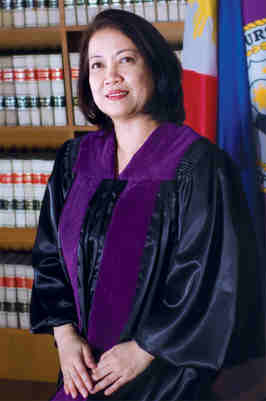
MANILA — The House Committee on Justice re-invited on Monday Chief Justice Ma. Lourdes Sereno in their next congressional hearing as the sole administrator of “expanded” sources of billions of pesos of Judiciary Development Fund (JDF) or the so-called judiciary’s pork barrel.
Oriental Mindoro Rep. Reynaldo Umali, vice chairman of the committee, said that Sereno is the lone manager of the JDF which was created under Presidential Decree No. 1949 issued by then President Ferdinand Marcos on July 18, 1984.
“Being the sole administrator, it is imperative and it is very necessary that the Chief Justice be invited,” Umali told House reporters in a chance interview.
“The particular matter at hand is JDF. Perhaps, should we make a distinction between the capacity in which the Chief Justice being requested as the sole administrator of the JDF and, therefore, it is also imperative that she be invited not as the Chief Justice or the head of the third branch but as the administrator, sole administrator pursuant to PD No. 1949 of the Judiciary Development Fund that is now the subject of the bills?” Umali asked.
Iloilo Rep. Niel Tupas, the panel chairman, agreed with the suggestion of Umali, reiterating that Sereno or her duly-authorized representatives should face them because “no one is above the law.”
On Sunday, Tupas said his committee would send the second invitation this week for Sereno or her representatives to face the congressional hearing next week on two bills aimed at promoting transparency and accountability in the use of JDF.
Cavite Rep. Elpidio Barzaga Jr. said it is very important for SC representatives to come to their hearing so that their positions will be considered on the twin bills reforming the JDF.
“It is not only a matter of courtesy why we are inviting persons of interest insofar as bills are concerned. We are inviting everybody who are stakeholders in the bills in compliance with the constitutional mandate to due process,” Barzaga, a lawyer, explained.
Ako Bicol Party-list Rep. Rodel Batocabe said he was disappointed why the SC failed to send their representatives during the first hearing on JDF bills when in his recollection, even a justice attended their previous hearings discussing court-related matters.
“If I can remember correctly, there were times when we have hearings wherein a Supreme Court justice was present. So, I’m wondering, why suddenly the Supreme Court demurred from attending the hearing. We want to study these proposals (bills) in order to make the JDF more accountable and transparent to the people and yet it seems that the Supreme Court is not bent on helping us in passing this bill,” Batocabe, a lawyer, stressed.
Earlier, Sereno stressed in a three-page letter to Speaker Feliciano Belmonte Jr. that the investigation does not promote good relationship between Congress and the Judiciary, citing separation of powers, and adding the SC is asking for more time to address the invitation.
Aside from Sereno, Deputy Court Administrator Raul Villanueva and SC Fiscal Management and Fiscal Management and Budget Office head, deputy clerk of court Corazon Ferrer-Flores, also did not attend the hearing pending guidance from the High Court.
Ilocos Norte Rep. Rodolfo Fariñas, also a panel vice chairman, filed House Bill 4690 to reform the JDF by promoting transparency and open this to regular full-auditing.
Tupas filed HB 4738 to repeal PD 1949, noting that the existence of JDF for 30 years has been hounded by allegations of lack of transparency in the accounting and reporting of the funds as well as irregularities and abuse of discretion on the allocation and disbursement of such funds.
In the case of HB 4690 filed by Fariñas, a member of the Commission on Appointments (CA) and a stalwart of the Nacionalista Party (NP), it aims at reforming the JDF by transferring the administration of fund from SC to the Bureau of Treasury to promote transparency and accountability.
The JDF shall come from the docket and other legal fees paid by party litigants where at least 80 percent of the funds shall be given to employees of the judiciary by way of cost of living allowances and not more than 20 percent of the JDF shall be used for office equipment and other facilities.
The JDF, under Tupas’ bill, will be replaced by a Judiciary Support Fund (JSF), which shall only be released to the SC only after it submits an itemized special budget and shall be deposited with the National Treasury as Special Account in the General Fund.
In 2003, or during the 12th Congress, the impeachment complaint filed against then Chief Justice Hilario Davide did not prosper.
Davide was accused of using the JDF for the renovation of SC vacation cottages in Baguio City instead of augmenting the salaries and allowances of the court judges and employees which the law dictates.